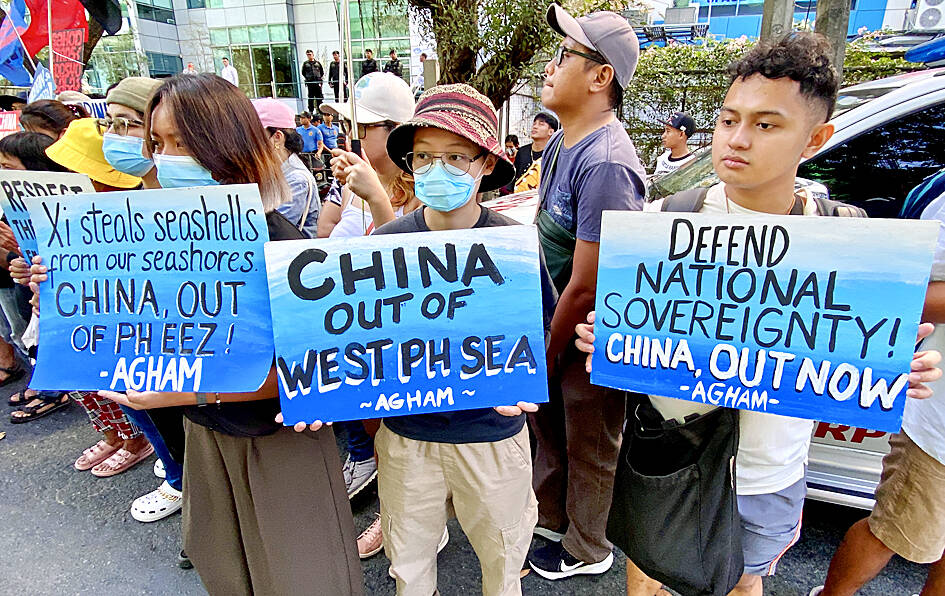Philippine Secretary of Defense Gilberto Teodoro has ordered the military to boost the number of troops stationed at the northernmost islands near Taiwan to fortify Manila’s territorial defense capabilities.
Teodoro also called for the development of more structures on the remote Batanes islands, less than 200km from Taiwan, during his visit to naval facilities there on Tuesday, the Philippine Navy said.
“Starting 2024, the operational tempo for the AFP [Armed Forces of the Philippines] will be higher,” Teodoro said, according to a Philippine Navy statement issued late on Tuesday.

Photo: EPA-EFE
The Bashi Channel between those islands and Taiwan is considered a choke point for vessels moving between the western Pacific and the contested South China Sea.
The Chinese military regularly sends ships and aircraft through the channel, Taiwan’s Ministry of National Defense has said.
In November last year, the militaries of the Philippines and the US launched joint patrols off the waters of the Philippines’ northernmost point.
Batanes is the “spearhead of the Philippines as far as the northern baseline is concerned,” said Teodoro, who was accompanied by the AFP and navy chiefs during his visit.
Teodoro’s visit “signifies a pivotal moment in our nation’s commitment to territorial defense and national security,” the Philippine Navy said.
Reuters reported in August that the US military was in talks to develop a civilian port in Batanes, a move that would boost US access to strategically located islands facing Taiwan.
The Philippines last year almost doubled the number of its military bases that US forces can access, including three facing Taiwan. China has said those moves were “stoking the fire” of regional tensions.
Batanes served as one of the training sites during last year’s joint military exercises, known as Balikatan, which involved more than 17,000 Filipino and American troops, making it the biggest-ever edition of the annual military drills.

The Ministry of the Interior (MOI) is to tighten rules for candidates running for public office, requiring them to declare that they do not hold a Chinese household registration or passport, and that they possess no other foreign citizenship. The requirement was set out in a draft amendment to the Enforcement Rules of the Public Officials Election and Recall Act (公職人員選舉罷免法 ) released by the ministry on Thursday. Under the proposal, candidates would need to make the declaration when submitting their registration forms, which would be published in the official election bulletin. The move follows the removal of several elected officials who were

The Republic of China (ROC) is celebrating its 114th Double Ten National Day today, featuring military parades and a variety of performances and speeches in front of the Presidential Office in Taipei. The Taiwan Taiko Association opened the celebrations with a 100-drummer performance, including young percussionists. As per tradition, an air force Mirage 2000 fighter jet flew over the Presidential Office as a part of the performance. The Honor Guards of the ROC and its marching band also heralded in a military parade. Students from Taichung's Shin Min High School then followed with a colorful performance using floral imagery to represent Taiwan's alternate name

FOUR DESIGNATED AREAS: Notices were issued for live-fire exercises in waters south and northwest of Penghu, northeast of Keelung and west of Kaohsiung, they said The military is planning three major annual exercises across the army, navy and air force this month, with the navy’s “Hai Chiang” (海強, “Sea Strong”) drills running from today through Thursday, the Ministry of National Defense said yesterday. The Hai Chiang exercise, which is to take place in waters surrounding Taiwan, would feature P-3C Orion maritime patrol aircraft and S-70C anti-submarine helicopters, the ministry said, adding that the drills aim to bolster the nation’s offshore defensive capabilities. China has intensified military and psychological pressure against Taiwan, repeatedly sending warplanes and vessels into areas near the nation’s air defense identification zone and across

A Chinese takeover of Taiwan would severely threaten the national security of the US, Japan, the Philippines and other nations, while global economic losses could reach US$10 trillion, National Security Council Deputy Secretary-General Lin Fei-fan (林飛帆) wrote in an article published yesterday in Foreign Affairs. “The future of Taiwan is not merely a regional concern; it is a test of whether the international order can withstand the pressure of authoritarian expansionism,” Lin wrote in the article titled “Taiwan’s Plan for Peace Through Strength — How Investments in Resilience Can Deter Beijing.” Chinese President Xi Jinping’s (習近平) intent to take Taiwan by force